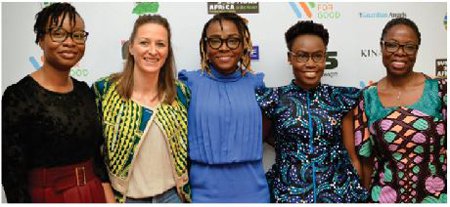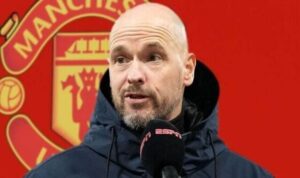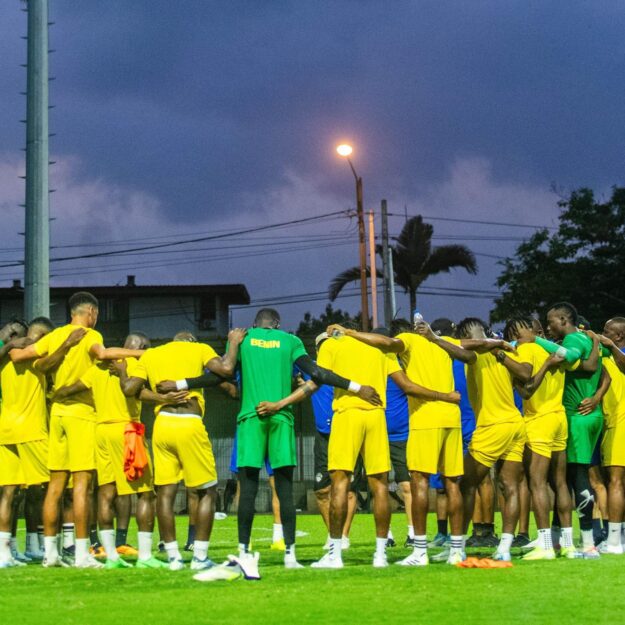
Mark Zuckerberg. That is one name that comes to mind as an innovator, pacesetter and exploring entrepreneurship at its best.Nigerian youths desirous of greater heights have begun to map out strategies on discovering their potentials. These are some of the revelations from this weeks, celebration of the International World Youths Skills day in Lagos, Yetunde Oladeinde reports.
For young people, the future holds a lot of promise. This is the time to dream big and aspire for great heights as game changers, pace setters and innovators in different areas of life. That was the scenario last Monday at Four Point Hotel, Lekki, Lagos, for the 2019 Sustainable Solutions Conference to mark World Youths Skills Day.
The hall was filled to the brim. Here, youth entrepreneurs and aspiring entrepreneurs listened with rapt attention, sought answers to burning issues and looked for clues at the feet of the masters; those who have survived and conquered the terrain.
CEO WeForGood, Temitope Ade Peters, set the tone for the event with her address, informing that the event marked the first phase of 30 under 30 Project and it was a way of redefining the unemployment challenges in Africa.
“The 2019 Sustainable Solutions Conference has been put together to commemorate the UN World Youth Skills Day. According to the United Nations, young people are almost three times more likely to be unemployed than adults and they are continuously exposed to lower quality of jobs, greater labour market inequalities, and longer and more insecure school-to-work transition. This is one reality we cannot continue to allow to play out unchallenged.”
Ade-Peters added that “this has formed the foundation on which WeForGood International has adopted the Sustainable Development Goals (SDGs) as its roadmap for effecting desired changes. By demanding an all-inclusive multifaceted approach, the SDGs provide us with a viable roadmap for tackling identified challenges related to poverty, infrastructure, innovation, and environmental sustainability which are key elements for building a better Africa.”
Making significant strides against many odds. That was the crux of Olutosin Adebowale’s entrepreneurial journey. “I would say that being purpose-driven is key to driving sustainable solutions. I don’t have a module but I have a story to tell. I am a survivor of domestic violence.”
Adebowale went down memory lane to recall how she was beaten and battered by her husband, treated badly at work and all these experiences began to take a toll on her productivity and self-esteem. “I was treated like trash. There were days when I was beaten with my baby and I would have to hide under the bed. I felt like trash but told myself that I needed to turn this around. I came up with purpose, not just for me alone but for other women in my shoes. I was driven by those slaps to create a purpose and started using trash to make beautiful things. The more I created those things the better I felt. At a point, I created Africa and I said to it, ‘you Africa, I am going to go all over you and I did that.’”
Interestingly, while she was going through the violence and trauma of violence, Adebowale kept writing poems that were motivational about her plight. “I wrote a lot of poems, telling others that their voices can liberate them. Now, I use Facebook as my supermarket. I believe so much in sustainability. We have to put our people before profit in whatever we do. In the last three years, we have been able to build three houses from the money we make from trash. The only regret I have is that I started late, in my 40s. I didn’t have a bank account, no passport and survival was number one on my list. Today, I am proud of my efforts, making treasures from waste.”
CEO Mitimeth, Achenyo Idachaba Obaro, talked about how she was inspired to research into how to convert water hyacinth weeds to wealth. “I had a burden to move back to Nigeria and do something at the grassroots as well as do something positive for the environment. It was after my research at Ibadan that I stumbled on water hyacinth.” Achenyo added that “my mission was to do an artisan economy. So, I zeroed in on the handicraft sector. I went to Sabo, where the northerners are based in Ibadan. I went from shed to shed demonstrating what I wanted. I was directed to a man’s shed, Mallam Yahaya, but there was a language barrier. Luckily, some children came to the rescue. That was how it started and every Saturday I sat there learning the skills. I knew that I wanted to transfer skills, empower communities and I was in a better position to take these skills and transfer.”
Happily, she informed that it’s been a period of co-creating with the people in the communities, her costumers and partnering with other institutions who underwrite this training with prerequisite skills. ”Even if we run out of water hyacinth, we are exploring other sources like banana fibre, bamboo for aesthetics and so on. Eight years on, we are ploughing back the profit and we have trained over 400 people while 80 artisans have been integrated into our supply chain.”
For CEO Pearl Recycling, a computer engineer, Olamide Babajide, who has also carved a niche for herself in the sustainable solution space converting used tyres and other wastes to furniture and décor: “I stumbled on it in 2012 when I travelled to the UAE for an assignment and I bought some décor which I brought home. I later discovered that they were made from waste and I was angry. I told myself that we had so much waste in Nigeria that I could work with.”
She continued: ‘I am a naturally creative person and I also come from a generation of wood carvers. I was open to learning and relearning. I wasn’t rigid.”
On his part, CEO Swiftthink, Ayoola Jolayemi, talked about his experience working with young entrepreneurs, getting data and documentation to improve their businesses.
“In 2007, I was working on some projects and I found that young people were struggling to find their feet. In 2009, we started Swiftthink to help young people craft their narratives properly. While I was doing this, three things occurred to me: ‘what questions are young people asking, what need I am meeting and what problems am I solving?’
While that was going on, Jolayemi found that the chunk of the people making impact were old people and he kept wondering where the young people were. “In 2014, we created a platform for young people and about 54,000 young people were impacted. In 2016, we set up a business sustainability platform every Thursday. It was a clinic where you meet with experts. We have set aside 3.5b per cent of our profit to support this in the last five years.”
Nigeria, he said, is a young country and it is important to have a good plan for the next generation. “If we don’t take care of our young people, we are on a time bomb. Young people should also be ready to put in the work to get its worth. I have an engineering school and I have been advising SMEs owned by young people. We empowered over 600 students between 2012 and 2015. Then the narrative was about us. But when we changed the narratives to impact on the people, things changed rapidly and between 2015 and 2019, we have empowered 10,744 students.”
According to the CEO Green Energy and Biofuels, Femi Oye, who describes himself as a social entrepreneur: ”This is a different breed of entrepreneur that works not to just build brand but we work to build trust. So, in the social entrepreneurship space, our currency is trust. When you build trust, then you will suddenly see big brands now coming behind you and then you can leap frog. This way you would be riding on the shoulder of giants. The problem we have as young people is what we have been sold to. Before now, wealth is being created based on the knowledge you have and the education that you have accumulated, intellect and big grammar that you can blow. But now, all that has moved into the palm, that is why you must work hard, use your hands to work to create wealth today.”
Oye went on to explain: ”If the growth on your outside is higher than the growth that you have on the inside, then the end has come. So, you have to invest first in yourself, develop your internal capacity. Know what we call long-suffering, perseverance, develop your tenacity and understand what delayed gratification is all about. You need to hang around people they would call stingy guys, those who won’t just lavish money at weekends. Those who won’t use Gucci and designers because you have a purpose that you are pursuing.”
He advised the young entrepreneurs to have a focus of who they want to be and how to achieve their dreams. “Don’t follow those earning big money when you have a multi billion naira company that you want to build. Some want to eat and die, while others want to feed generations. You must know where you belong. When you develop that, then you would begin to attract the right people that would give you the right advice; then you can scale it.
Oye continued: “I actually don’t need money because if you really need money to fulfill that idea, that business, that means that God is making a mistake. Your job is to create, the business is hanging somewhere. If you can show up with the solution, your customer would pay. Personally, that was what I used. I called a group together, I showed them my solution; ‘this is what I want to do, this is how much it will cost each of you to order my products upfront.’ I did a prototype and I showed them how the biogel would work and look and they were interested. In three weeks, I raised 36 million naira from about five hundred people. I took this money to the market to create the value. I promised them two weeks to deliver but I couldn’t deliver until after four weeks. They were my community, the trusted me that I won’t run away with their money and they were patient with me. That was how I had my first breakthrough.”
Like Oye, Chief Inspiration Officer Bruno’s Place, Brunoh Oaikhinana, took the young entrepreneurs through how he metamorphosed from the banking hall to become a barber, groomed by Bobby Eke, aka Bobby’s Signature. “Then as a banker, I was earning 500,000 naira a month and I thought it was big money. Now, my shop in Abuja, I pay 1.5 million naira monthly, the one in Ikeja City Mall, I pay 2.2 million monthly. From Lekki, we went to Abuja and we are testing the model. Now, it’s on autopilot and I have barbers that are earning over 200,000 naira a month.”
The conference, which had over 200 attendees, came to a climax with the official announcement of the Fellows of the 30Under30Project, a blended fellowship and accelerator that WeForGood International has launched to promote skills for sustainable development, specifically for reducing unemployment on the continent, starting with Nigeria.
The Sustainable Solutions Africa Conference was put together with the partnership of IHS Nigeria, as well as the support of the Lagos State Employment Trust Fund (LSETF), Guardian Angels, Kinabuti and Mitimeth.
You may be interested

AFCON 2025Q: New Boy Osho, Iheanacho, Start For Super Eagles Vs Benin Republic
Webby - November 14, 2024The Super Eagles will line-up in a 3-4-3 formation in tonight’s 2025 Africa Cup of Nations qualifying tie against Benin…

My Goal Was To Achieve Success With Ten Hag At Man United –De Ligt
Webby - November 14, 2024Netherlands international Matthijs de Ligt has suggested Erik ten Hag didn’t get the breaks he needed to keep his job…

I Want To Take My Game To New Level –Lookman
Webby - November 13, 2024Super Eagles winger Ademola Lookman has reiterated his commitment to take his game to the next level.The Nigerian international, who…






















![American Pastor, David Wilson Seen Eating The Box Of Woman Who Isn’t His Wife [Video]](https://onlinenigeria.com/wp-content/uploads/2019/10/american-pastor-david-wilson-seen-eating-the-box-of-woman-who-isnt-his-wife-video-150x150.jpg)






![Okey Bakassi Reacts To Video Of Lady Undergoing Butt Enlargement With Clay Pot [Video]](https://onlinenigeria.com/wp-content/uploads/2019/07/okey-bakassi-reacts-to-video-of-lady-undergoing-butt-enlargement-with-clay-pot-video-150x150.jpg)


